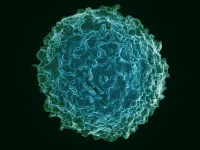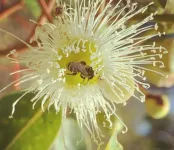(Press-News.org)
What keeps some immune systems youthful and effective in warding off age-related diseases? In a new paper published in Cellular & Molecular Immunology, USC Stem Cell scientist Rong Lu and her collaborators point the finger at a small subset of blood stem cells, which make an outsized contribution to maintaining either a youthful balance or an age-related imbalance of the two main types of immune cells: innate and adaptive.
Innate immune cells serve as the body’s first line of defense, mobilizing a quick and general attack against invading germs. For germs that evade the body’s innate immune defenses, the second line of attack consists of adaptive immune cells, such as B cells and T cells that rely on their memory of past infections to craft a specific and targeted response. A healthy balance between innate and adaptive immune cells is the hallmark of a youthful immune system—and a key to longevity.
“Our study provides compelling evidence that when a small subset of blood stem cells overproduces innate immune cells, this drives the aging of the immune system, contributes to disease, and ultimately shortens the lifespan,” said Lu, who is an associate professor of stem cell biology and regenerative medicine, biomedical engineering, medicine, and gerontology at USC, and a Leukemia & Lymphoma Society Scholar. Lu is also a member of the Eli and Edythe Broad Center for Regenerative Medicine and Stem Cell Research at USC, and the USC Norris Comprehensive Cancer Center at the Keck School of Medicine of USC. “Our findings suggest that restraining the small subset of blood stem cells that are overproducing innate immune cells could be an effective way to delay immune aging.”
In the study, first author Anna Nogalska and her colleagues found striking differences in how quickly the immune system ages—even among lab mice with the same genetic background raised in identical conditions. By the advanced age of 30 months, delayed aging mice retained a youthful balance of innate and adaptive immune cells. However, early aging mice showed a big increase in innate immune cells relative to adaptive immune cells.
By tracking the individual blood stem cells responsible for producing both innate and adaptive immune cells, the scientists discovered the subset of blood stem cells primarily responsible for the age-associated imbalance of the immune system. Specifically, the scientists observed that thirty to forty percent of blood stem cells dramatically changed their preference for producing innate versus adaptive immune cells as the mice aged.
In delayed agers, the subset of blood stem cells decreased their production of innate immune cells, protecting against the effects of aging. Among delayed agers, there was an increase in gene activity related to blood stem cells’ regulation and response to external signals—which might keep their production of innate immune cells in check. When the scientists used CRISPR to edit out these genes, blood stem cells reversed their natural tendency and produced more innate immune cells instead of adaptive immune cells—like in the early agers.
In contrast, in early agers, the subset of blood stem cells shifted towards producing more innate immune cells, which, in excess, lead to many diseases of aging. Accordingly, in these early agers, the scientists found an increase in gene activity related to the proliferation of blood stem cells and the differentiation of innate immune cells. When the scientists used CRISPR to edit out these early aging genes, blood stem cells produced more adaptive immune cells instead of innate immune cells—becoming more similar to those in the delayed agers.
Importantly, delayed agers tended to live longer than early agers.
“In the elderly human population, the immune system often tips into producing an overabundance of innate immune cells, which can contribute to diseases such as myeloid leukemia and immune deficiencies,” said Nogalska, senior scientist and lab manager in the Lu Lab. “Our study suggests how we might promote a more youthful immune system to combat these common diseases of aging.”
Additional co-authors are Jiya Eerdeng, Samir Akre, Mary Vergel-Rodriguez, Yeachan Lee, Charles Bramlett, Adnan Y. Chowdhury, Bowen Wang, Colin G. Cess, and Stacey D. Finley from USC.
Ninety percent of the project was supported by federal funding from the National Institutes of Health (grants R00-HL113104,R01HL138225, R35HL150826, and 1F31HL149278-01A1) and the National Cancer Institute (grant P30CA014089). Additional funding came from the California Institute for Regenerative Medicine (grant EDUC4-12756R) and the Leukemia & Lymphoma Society (grant LLS-1370-20).
END
Suicide risk is highest on Mondays and increased on New Year’s Day, whereas suicide risk on weekends and Christmas varies by country and region, finds an analysis of data from 26 countries published by The BMJ today.
The researchers say their results can help to better understand the short term variations in suicide risks and define suicide prevention action plans and awareness campaigns.
According to the World Health Organization, more than 700,000 people died due to suicide in 2019, accounting for approximately 1.3% of deaths, which was higher than the number of deaths by malaria, HIV/AIDS, and breast cancer.
Previous studies have shown that suicide ...
Using a gene signature technique to tailor chemotherapy for patients with early triple negative breast cancer shows promise as a way to improve disease-free survival, finds a clinical trial published by The BMJ today.
Triple negative breast cancer is an aggressive type of breast cancer that carries a higher risk of recurrence and death after standard treatment. As such, there is an urgent need for more effective chemotherapy strategies.
Multigene signatures are tests that analyse genes in a tumour sample to predict how well ...
Pharmaceutical companies have paid an estimated £156 million to NHS trusts in England between 2015 and 2022 without the public being told what the payments are for, reveals an investigation by The BMJ today.
The findings raise important questions about unrecognised conflicts of interest and have led to calls for a shake-up of current transparency rules.
The BMJ tracked all disclosed non-research payments to NHS trusts in England from 2015 to 2022 reported in Disclosure UK, a database run by the Association of the British Pharmaceutical Industry (ABPI), which requires participating companies to disclose cash payments and other benefits in ...
Maternal antibodies passed across the placenta can interfere with the response to the malaria vaccine, which would explain its lower efficacy in infants under five months of age, according to research led by the Barcelona Institute for Global Health (ISGlobal), in collaboration with seven African centers (CISM-Mozambique, IHI-Tanzania, CRUN-Burkina Faso, KHRC-Ghana, NNIMR-Ghana, CERMEL-Gabon, KEMRI-Kenya). The findings, published in Lancet Infectious Diseases, suggest that children younger than currently recommended by the WHO may benefit from the RTS,S and R21 malaria vaccines if they live in areas with low malaria transmission, ...
Teaching needs to be made more attractive to a wider pool of graduates to tackle shortages in the profession, according to new international research comparing 18 countries.
The worldwide comparison led by Durham University, UK, shows that the level of pay relative to other graduate professions, lack of resources and poor student behaviour all play a part in recruitment and retention issues.
Popular quick-fix strategies used across the world to attract and retain teachers, such as bursaries, scholarships and ...
Latest research has revealed a “positive association” between the number of properties listed as Airbnb rentals and police-reported robberies and violent crimes in thousands of London neighbourhoods between 2015 and 2018.
In fact, the study from University of Cambridge and the University of Pennsylvania suggests that a 10% increase in active Airbnb rentals in the city would correspond to an additional 1,000 robberies per year across London.*
Urban sociologists say the rapid pace at which crime rises in conjunction with new rentals suggests that the link is related more to opportunities for crime, rather than loss ...
A new report by researchers from the University of Cambridge and the London School of Economics and Political Science (LSE) argues the UK government should invest in green infrastructure now or watch productivity lag behind China, the United States and other countries already running away with the benefits.
Is reaching net zero a growth and prosperity plan? by former Head of Economic Forecasting at the UK Treasury, Dimitri Zenghelis, says the government’s self-imposed rules on infrastructure investment must be modernised to spur the innovation needed for UK prosperity.
The ...
New Curtin-led research has revealed Marri trees are critical to the survival of more than 80 species of native bee in Western Australia’s South West region, which is one of the world’s most biologically rich but threatened biodiversity hotspots.
Lead author Dr Kit Prendergast, Adjunct Research Fellow from the Curtin School of Molecular and Life Sciences, said the study identified the Marri (Corymbia calophylla), which is native to the South West and was named a ‘near threatened’ species in 2019, as a crucial supplier of food for native bees and supporter of the region’s ecosystem.
“The findings that these trees support at ...
Barcelona, Spain: Drugs designed to target HER2-postive breast cancer could also benefit some patients with bile duct cancer, according to results of a patient trial to be presented on Thursday at the 36th EORTC-NCI-AACR [1] Symposium on Molecular Targets and Cancer Therapeutics in Barcelona, Spain. Bile duct cancer is rare, treatment options are limited, and the survival rates are low.
The trial also suggests that a wider group of breast cancer patients – those with HER2-mutated breast cancer – could be treated with these ...
Study focused on ‘Goldilocks Gene’ CHD2 that causes autism and epilepsy
Deletion of long non-coding RNA CHASERR produces too much CHD2 protein in the cell, leaving patients wheelchair-bound, nonverbal and with intellectual delays
Patient’s dad from study: ‘We intuitively understood this was a lot bigger than just Emma’
‘It is mind-boggling that we only know what 1% of the human genome does’
CHICAGO --- When a gene produces too much protein, it can have devastating consequences on brain development and function. ...



